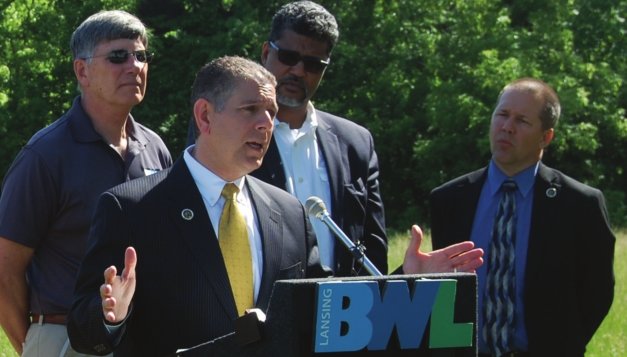
Critics on the Lansing City Council have the votes to kill a controversial plan to turn a downtown park near REO Town into the home of a power substation.
But the plan may not be dead, because a Council majority backs letting voters decide. If the citizens approve, then the plan could proceed, albeit subject to final approval by the Council.
The Board of Water & Light has proposed building the Central Substation in Scott Park at Washington Avenue and Malcolm X Street south of I-496. To do so, the nearly 100-yearold Scott house would have to be moved or demolished and its sunken gardens relocated nearby. Preservationists and Garden Club members have campaigned to prevent either from happening.
Council members Carol Wood, Jody Washington, Adam Hussain, Judi Brown Clarke, and Patricia Spitzley favor a referendum, and Jessica Yorko said she is leaning toward it. Five votes are needed to place it on the ballot and six to protect it from being vetoed by Lansing Mayor Virg Bernero, who favors the plan.
“The Scott Center is dedicated park property,” said Wood, an at-large member. “You cannot give it away without a vote of the people. Period.”
Randy Hannan, the mayor’s chief of staff, said rejecting the plan “would be a devastating blow to the BWL’s efforts to update the electric transmission infrastructure that Lansing residents and businesses depend on every day. Such a rejection would delay the closing of the coal-fired Eckert plant by an additional seven years at a cost of $30 million.”
Proponents believe a referendum is unnecessary because the proposal has had numerous public hearings and meetings. A vote could not occur until at least November, putting the groundbreaking date of the project back by several months. BWL officials have said they wanted to break ground right after Labor Day.
In April, after hearing hours of public testimony — mostly against the plan — the city’s Park Board supported the plan by voting 5-3 to remove the property’s parkland designation.
In May, with many opponents in the audience, the Planning Board delayed a vote till this month. Both boards are only advisory.
Utility officials call the city park location the “only viable option” for the proposed substation, which would serve downtown.
The current substation is located at the Eckert Power Station along the Grand River in REO Town in a floodplain, which the BWL says is too risky.
The coal-fired Eckert plant is due to be closed in 2020.
BWL officials say that building a new substation at Eckert above the floodplain would continue the emissions of coal dust and other pollutants and cost $43 million more than the $26 million one proposed for Scott Park. Of that, $13 million would be for building in the floodplain, while the remaining $30 million would be used to continue operating Eckert for seven more years.
The utility plans to shut down Eckert on Jan. 1, 2020. It is looking at $1.69 billion in energy infrastructure and generation proposals to replace the energy created by the plant. Serkaian said Tuesday that an additional $30 million spent to continue operations would not impact the other energy development proposal costs.
Brown Clarke, the Council’s president, dismissed concerns about building in the floodplain. She pointed to the SkyVue project under construction on Michigan Avenue and the Frandor shopping center as examples of projects in floodplains. She pointed to the proposed Red Cedar Renaissance project on the former Red Cedar Golf Course as another example.
The issue at play is whether allowing the BWL to use the park runs afoul of the City Charter’s requirement that the “sale” of parkland and riverfront property — the park represents both — be subject to approval of the people through a vote.
Hannan challenged that contention. He said the park would still remain city property because the BWL is in essence part of the city government as a public utility.
However, city assessor property records show that all the property held by the BWL lists the utility as the taxpayer of record, not the city. Hannan said Tuesday the property would remain titled to the city.
Wood questioned whether the utility could finance the project without title to the property. She said based on her review of the City Charter Commission minutes, transfer of parkland — not just a sale — requires a vote of the people.
The park property hosts the former home of Orien Jenison, an early city leader. Moved to the park in the 1970s, the city had rented space in it for offices for nonprofits. But in recent years, it has only been used for storage and has been poorly maintained.
At a press conference Tuesday, the city, the BWL and Habitat for Humanity announced a proposal to move the house to a vacant city lot at Martin Luther King Boulevard and Hillsdale Street. The house would become the centerpiece of what Bernero described as an “affordable” housing project.
If the substation proposal does end up on the ballot, TJ Bucholz, president of Vanguard Public Affairs, said the utility would need to spend $75,000 to win approval , while opponents could expect to spend $40,000 to $50,000.
Support City Pulse - Donate Today!
Comments
No comments on this item Please log in to comment by clicking here